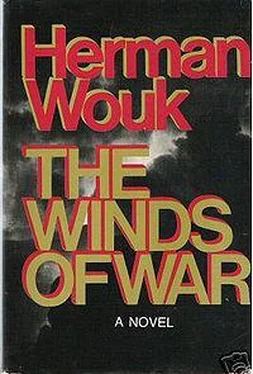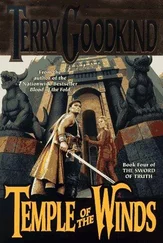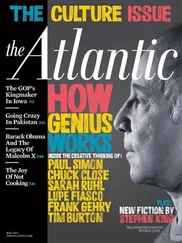Herman Wouk - The Winds of War
Здесь есть возможность читать онлайн «Herman Wouk - The Winds of War» весь текст электронной книги совершенно бесплатно (целиком полную версию без сокращений). В некоторых случаях можно слушать аудио, скачать через торрент в формате fb2 и присутствует краткое содержание. Год выпуска: 1971, Издательство: Collins, Жанр: Историческая проза, на английском языке. Описание произведения, (предисловие) а так же отзывы посетителей доступны на портале библиотеки ЛибКат.
- Название:The Winds of War
- Автор:
- Издательство:Collins
- Жанр:
- Год:1971
- ISBN:нет данных
- Рейтинг книги:4 / 5. Голосов: 1
-
Избранное:Добавить в избранное
- Отзывы:
-
Ваша оценка:
- 80
- 1
- 2
- 3
- 4
- 5
The Winds of War: краткое содержание, описание и аннотация
Предлагаем к чтению аннотацию, описание, краткое содержание или предисловие (зависит от того, что написал сам автор книги «The Winds of War»). Если вы не нашли необходимую информацию о книге — напишите в комментариях, мы постараемся отыскать её.
About the Author
Herman Wouk's acclaimed novels include the Pulitzer-Prize winning
;
;
;
;
;
; and
.
The Winds of War — читать онлайн бесплатно полную книгу (весь текст) целиком
Ниже представлен текст книги, разбитый по страницам. Система сохранения места последней прочитанной страницы, позволяет с удобством читать онлайн бесплатно книгу «The Winds of War», без необходимости каждый раз заново искать на чём Вы остановились. Поставьте закладку, и сможете в любой момент перейти на страницу, на которой закончили чтение.
Интервал:
Закладка:
His greeting to the two American couples ahead of the Henrys was casual. He did not smile, and his restless eyes wandered away from them and back again as he shook hands.
A protocol officer in a sky-blue, gold-crusted foreign service uniform intoned in German:
“ The naval attaché to the embassy of the United States of America, Commander Victor Henry! ”
The hand of the Führer was dry, rough, and it seemed a bit swollen. The clasp was firm as he scanned Henry’s face. Seen this close the deep-sunk eyes were pale blue, puffy, and somewhat glassy. Hitler appeared fatigued; his pasty face had streaks of sunburn on his forehead, nose and cheekbones, as though he had been persuaded to leave his desk in Berchtesgaden and come outside for a few hours. To be looking into this famous face with its hanging hair, thrusting nose, zealot’s remote eyes, and small moustache was the strangest sensation of Henry’s life.
Hitler said, “Willkommen in Deutschland,” and dropped his hand.
Surprised that Hitler should be aware of his recent arrival, Pug stammered, “ Danke, Herr Reichskanzler .”
“ Frau Henry !” Rhoda, her eyes gleaming, shook hands with Adolf Hitler. He said, in German, “I hope you are comfortable in Berlin.” His voice was low, almost folksy; another surprise to Henry, who had only heard him shouting hoarsely on the radio or in the newsreels.
“Well, Herr Reichskanzler, to tell the truth I’ve just begun looking for a house,” Rhoda said breathlessly, too overcome to make a polite reply and move on.
“You will have no difficulty.” Hitler’s eyes softened and warmed at her clear German speech. Evidently he found Rhoda pretty. He kept her hand, faintly smiling.
“But there are so many charming neighborhoods in Berlin that I’m bewildered. That’s the real problem.”
This pleased or amused Hitler. He laughed, kicked his knee inward, and turning to an aide behind him, said a few words. The aide bowed. Hitler held out his hand to the next guest. The Henrys moved on to the Bulgarian.
The reception did not last long. Colonel Forrest, the military attaché, a fat Army Air officer from Idaho who had been in Germany for two years, introduced the Henrys to foreign attachés and Nazi leaders, including Goebbels and Ribbentrop, who looked just like their newsreel pictures, but oddly diminished. These two, with their perfunctory fast handshakes, made Henry feel like the small fry he was; Hitler had not done that. Pug kept trying to watch Hitler. The Führer wore black trousers, a gray double-breasted coat with an eagle emblem on one arm, and a small Iron Cross on his left breast. By American styles the clothes were cut much too full. This gave the leader of Germany the appearance of wearing secondhand, ill-fitting garments. Hitler from moment to moment looked restless, tired, or bored, or else he flashed into winning charm. He was seldom still. He shifted his feet, turned his head here and there, clasped his hands before him, folded them, gestured with them, spoke absently to most people and intensely to a few, and every so often did the little knee kick. Once Pug saw him eating small iced cakes from a plate, shoving them toward his mouth with snatching greedy fingers while he talked to a bemedalled visitor. Shortly thereafter he left, and the gathering started to disperse.
It was drizzling outside; the massed red flags were drooping, and from the helmets of the erect guards water ran unheeded down their faces. The women clustered in the entrance while Pug, Colonel Forrest, and the chargé d’affaires went out to hail the embassy cars. The chargé, a moustached man with a pale clever face full of wrinkles, and a weary air, ran the embassy. After the Crystal Night, President Roosevelt had recalled the ambassador, and not yet sent him back. Everybody in the embassy disliked this policy. It cut the Americans off from some official channels, and hampered their ability to conduct even the business of interceding for Jews. The staff thought the President had made a political gesture toward the New York Jews that, in Germany, seemed ineffectual and laughable.
The chargé said to Henry, “Well, what did you think of the Führer?”
“I was impressed. He knew I’d just arrived.”
“Really? Well, now you’ve seen German thoroughness. Somebody checked, and briefed him.”
“But he remembered. In that long line.”
The chargé smiled. “Politician’s memory.”
Colonel Forrest rubbed his broad flat nose, smashed years ago in a plane crash, and said to the chargé, “The Führer had quite a chat with Mrs. Henry. What was that about, Pug?”
“Nothing. Just a word or two about house-hunting.”
“You have a beautiful wife,” the chargé said. “Hitler likes pretty women. And that’s quite a striking suit she’s wearing. They say Hitler likes pink.”
Two days later, Henry was working at the embassy at a morning pile of mail, in an office not unlike his old cubicle in War Plans — small, crowded with steel files, and with technical books and reports. This one had a window, and the view of Hitler’s chancellery slightly jarred him each morning when he got there. His yeoman buzzed from a tiny anteroom smelling of mimeograph ink, cigarette smoke, and overbrewed coffee, like yeomen’s anterooms everywhere.
“Mrs. Henry, sir.”
It was early for Rhoda to be up. She said grumpily that a man named Knödler, a renting agent for furnished homes, had sent his card to their hotel room, with a note saying he had been advised they were looking for a house. He was waiting in the lobby for an answer.
“Well, what can you lose?” Henry said. “Go and look at his houses.”
“It seems so odd. You don’t suppose Hitler sent him?”
Pug laughed. “Maybe his aide did.”
Rhoda called back at three-thirty in the afternoon. He had just returned from lunch. “Yes?” he yawned. “What now?” The long heavy wine-bibbing meal of the diplomats was still too much for him.
“There’s this wonderful house in the Grunewald section, right on a lake. It even has a tennis court! The price is ridiculously cheap, it doesn’t come to a hundred dollars a month. Can you come right away and look at it?”
Pug went. It was a heavily built gray stone mansion roofed in red tile, set amid tall old trees on a smooth lawn sloping to the water’s edge. The tennis court was in back, beside a formal garden with flower beds in bloom around a marble fountain swarming with large goldfish. Inside the house were Oriental carpets, large gilt-framed old paintings, a walnut dining table with sixteen blue silk-upholstered chairs, and a long living room cluttered with elegant French pieces. The place had five upstairs bedrooms and three marbled baths.
The agent, a plump matter-of-fact man of thirty or so, with straight brown hair and rimless glasses, might have been an American real estate broker. Indeed he said that his brother was a realtor in Chicago and that he had once worked in his office. Pug asked him why the price was so low. The agent cheerfully explained in good English that the owner, Herr Rosenthal, was a Jewish manufacturer, and that the house was vacant because of a new ruling affecting Jews. So he badly needed a tenant.
“What’s this new ruling?” Henry asked.
“I’m not too clear on it. Something related to their owning real estate.” Knödler spoke in an entirely offhand tone, as though he were discussing a zoning regulation in Chicago.
“Does this man know you’re offering the house to us, and at what price?” Pug said.
“Naturally.”
“When can I meet him?”
“Any time you say.”
Next day Pug used his lunch hour for an appointment with the owner. After introducing them in the doorway of the house, the agent went and sat in his car. Herr Rosenthal, a gray-headed, paunchy, highly dignified individual, clad in a dark suit of excellent English cut, invited Henry inside.
Читать дальшеИнтервал:
Закладка:
Похожие книги на «The Winds of War»
Представляем Вашему вниманию похожие книги на «The Winds of War» списком для выбора. Мы отобрали схожую по названию и смыслу литературу в надежде предоставить читателям больше вариантов отыскать новые, интересные, ещё непрочитанные произведения.
Обсуждение, отзывы о книге «The Winds of War» и просто собственные мнения читателей. Оставьте ваши комментарии, напишите, что Вы думаете о произведении, его смысле или главных героях. Укажите что конкретно понравилось, а что нет, и почему Вы так считаете.












